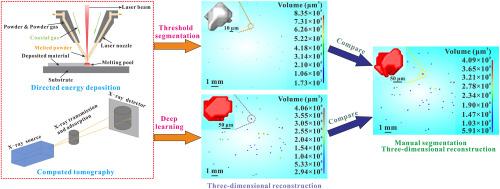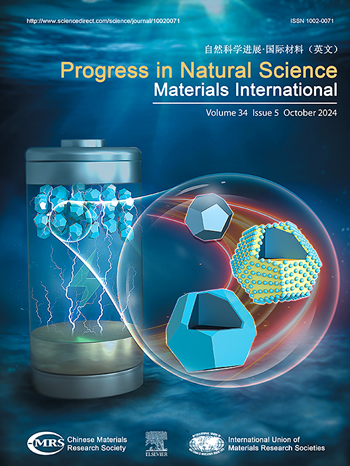基于深度学习图像识别的 inconel 625 超级合金缺陷三维定量表征
IF 4.8
2区 材料科学
Q2 MATERIALS SCIENCE, MULTIDISCIPLINARY
Progress in Natural Science: Materials International
Pub Date : 2024-10-01
DOI:10.1016/j.pnsc.2024.07.015
引用次数: 0
摘要
超合金缺陷的三维(3D)定量表征是提高材料设计和使用寿命预测能力的重要途径。本研究采用深度学习(DL)图像识别技术和三维图像重建技术,对激光增材制造(LAM)工艺制造的Inconel 625超耐热合金的缺陷进行了三维空间分布分析。首先,使用计算机断层扫描(CT)技术获取样品的连续切片图像。应用 U-net DL 算法对连续切片中的材料缺陷进行智能识别。在此基础上,利用三维重建软件对空间缺陷位置和典型尺寸进行定量识别和分析。与传统的阈值分割(TS)技术相比,缺陷识别率从 61.90% 显著提高到 95.00%。这项工作为有效表征合金缺陷和损伤(尤其是在材料性能评估过程中)提供了一种前景广阔的表征方法。本文章由计算机程序翻译,如有差异,请以英文原文为准。

Three-dimensional quantitative characterization of defects in inconel 625 superalloy based on deep learning image identification
Three-dimensional (3D) quantitative characterization of defects in superalloys is an important way to promote the ability of material design and service life prediction. In this work, 3D spatial distribution of defects for Inconel 625 superalloy manufactured by laser additive manufacturing (LAM) is carried out deep learning (DL) image identification technology and 3D image reconstruction. Firstly, computer tomography (CT) technology was used to obtain continuous slice images of sample. The U-net DL algorithm was applied to intelligently identify material defects in the continuous slices. On this basis, quantitative identification and analysis of spatial defect positions and typical sizes is achieved by using 3D reconstruction software. Compared with traditional threshold segmentation (TS) techniques, the defect recognition rate has significantly improved from 61.90 % to 95.00 %. This work provides a promising characterization method for efficient characterizing alloy defects and damage especially during material performance evaluation.
求助全文
通过发布文献求助,成功后即可免费获取论文全文。
去求助
来源期刊
CiteScore
8.60
自引率
2.10%
发文量
2812
审稿时长
49 days
期刊介绍:
Progress in Natural Science: Materials International provides scientists and engineers throughout the world with a central vehicle for the exchange and dissemination of basic theoretical studies and applied research of advanced materials. The emphasis is placed on original research, both analytical and experimental, which is of permanent interest to engineers and scientists, covering all aspects of new materials and technologies, such as, energy and environmental materials; advanced structural materials; advanced transportation materials, functional and electronic materials; nano-scale and amorphous materials; health and biological materials; materials modeling and simulation; materials characterization; and so on. The latest research achievements and innovative papers in basic theoretical studies and applied research of material science will be carefully selected and promptly reported. Thus, the aim of this Journal is to serve the global materials science and technology community with the latest research findings.
As a service to readers, an international bibliography of recent publications in advanced materials is published bimonthly.

 求助内容:
求助内容: 应助结果提醒方式:
应助结果提醒方式:


